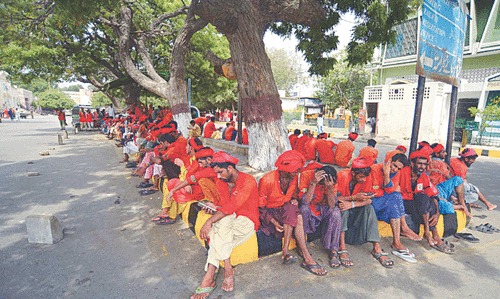KARACHI, Aug 5: The Karachi Electricity Supply Company is duty-bound to ensure uninterrupted power supply to the consumers, a division bench of the Sindh High Court observed on Tuesday.
The bench, which consisted of Justices Ali Sain Dino Metlo and Rana M. Shamim, was hearing a petition moved by civil rights activist S.M. Iqbal Kazmi to challenge the frequent unscheduled, unannounced and prolonged power breakdowns on the pretext of load-shedding necessitated by power shortage.
Representing the federal ministry of water and power, Deputy Attorney-General Umar Hayat Sindhu submitted that the ministry or the Water and Power Development Authority (Wapda) were not to blame for electricity shutdowns in Karachi. Despite its being a defaulter to the tune of Rs20 billion, Wapda was regularly supplying electricity to the KESC. In fact, supplies meant for other cities were trimmed to ensure adequate supply to Karachi because of its importance as a hub of trade and industry.
The KESC earlier submitted that it was not getting sufficient supply to ensure uninterrupted distribution. There was also the problem of power theft and transmission losses. The problems faced by the company required both long-term and short-term solutions. It would take some time to set things right, it said.
The petitioner contended that the KESC was working without a chief executive and its chairman remained abroad for long periods. The reply to the petition had been made by certain employees and the court should ask the chairman to file an affidavit. He challenged the privatization of the corporation as illegal and unconstitutional.
The KESC sought time to file a rejoinder to the averments made by Wapda and the petitioner. The bench adjourned further hearing to a date in office.
It also issued notices to the respondent in another petition filed by Advocate Akhtar Jamal against the privatization of the KESC and the hardship caused by its erratic working.
Cellphone tower
The Sindh High Court issued notices to the home secretary and the city district government Karachi in a petition challenging the provincial ombudsman’s order for removal of a mobile phone company’s tower atop a residential building in North Karachi.
Justices Munib Ahmed Khan and Syed Pir Ali Shah, who constituted the bench, seized of a petition moved by cellphone company Mobilink through Advocate Faisal Kamal Alam, and appointed Advocate Abdur Rehman, a Shehri counsel in several cases, as amicus curiae.The impugned order by the ombudsman came on a complaint submitted by the Haq Pride Apartments, North Karachi, saying that the builder has allowed Mobilink to install a ‘base transceiver station’ on the rooftop of the complex in return for a heavy payment and to the detriment of the owners of the flats. The complainants said the tower posed an environmental threat as it caused radiation. They said their complaints to the Karachi Building Control Authority in this behalf failed to elicit any response.
Mobilink challenged the ombudsman’s ruling on the ground that he had no authority to adjudicate a dispute between two private parties. No maladministration by and government agency or department was involved in the case to justify assumption of jurisdiction by the ombudsman. Besides, Advocate Faisal said, no notice was issued to the petitioner company and an adverse order was passed against it without affording it an opportunity of hearing. The lawyer cited a Supreme Court ruling to assert that an order without jurisdiction by the ombudsman could be challenged in the high court without seeking its reversal by a representation to the provincial governor.
The bench issued notices to the respondents after briefly hearing the counsel.
Inquiry
Justice Khwaja Naveed Ahmed referred a senior civil judge for inquiry and action for passing an order for the eviction of a tenant on a Sunday.
An application, assigned to the judge by acting Chief Justice Azizullah M. Memon, said the proprietor of M/s Noorani Travels, Shop 13, Yousufali Alibhoy Building, Altaf Hussain Road, New Chali, who claims to be tenant of the shop since 1979, was dispossessed on July 6. The property has also been demolished.
The action was taken following an order passed by the senior civil judge, IV, and rent controller, district South, Karachi, on Sunday July 6, 2008. The order said: “Case called. Advocate for the decree older is present. Argument heard on execution application … Issue writ of dispossession against the judgment debtor along with the bailiff and police aid. Case put off to 14.7.2008 for return of writ.”
The applicant said the high court had passed a stay order in his favour in 1997 but the landlord, who was raising a new structure on the entire commercial plot, took advantage of a Supreme Court order that barred the demolition of Shops 1 and 4.
Directing the office to place the matter before the ACJ for inquiry and action against the senior civil judge on administrative side, Justice Ahmed restrained the defendant builder-owner from creating third party interest in the disputed property.











































Dear visitor, the comments section is undergoing an overhaul and will return soon.